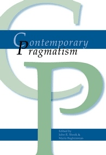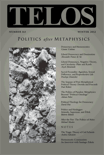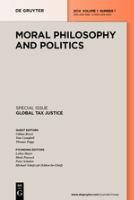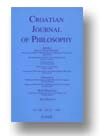
Contemporary Pragmatism
Scope & Guideline
Navigating the Landscape of Modern Philosophical Inquiry
Introduction
Aims and Scopes
- Interdisciplinary Applications of Pragmatism:
The journal emphasizes the use of pragmatic principles across diverse fields such as ethics, education, politics, and technology, showcasing how pragmatism can inform practical solutions to real-world problems. - Philosophical Engagement with Historical Figures:
Many papers engage with the ideas of foundational pragmatist thinkers such as Dewey, Rorty, and James, critically reassessing their contributions and relevance to modern philosophical debates. - Critical Analysis of Contemporary Issues:
The journal addresses pressing contemporary topics, including democracy, technology, and ethics, using pragmatist frameworks to evaluate and propose solutions. - Methodological Innovations in Research:
The journal encourages the use of mixed methods and novel research methodologies, particularly in the social sciences, to enhance the understanding and application of pragmatism. - Focus on Ethical and Social Implications:
A significant aspect of the journal's scope involves examining the ethical dimensions of pragmatic philosophy, particularly in relation to social justice, democracy, and community engagement.
Trending and Emerging
- Digital Democracy and Communication:
Recent publications highlight the intersection of digital technologies and democratic practices, exploring how communication shapes democratic engagement in the digital age. - Ethics and Technology:
There is a growing focus on the ethical implications of technology, particularly in relation to artificial intelligence and its impact on society, showcasing the relevance of pragmatism in addressing modern ethical dilemmas. - Somaesthetics and Relational Meaning:
Emerging discussions around somaesthetics emphasize the importance of bodily experiences and relational aspects of meaning-making, indicating a trend towards more embodied and experiential approaches in pragmatist philosophy. - Pragmatism and Social Justice:
Increasing attention is being paid to the application of pragmatism in social justice issues, reflecting a commitment to addressing inequality and promoting ethical engagement in community contexts. - Mixed Methods Research:
The journal is seeing a rise in the application of mixed methods research, particularly in social sciences, which aligns with pragmatism's emphasis on practical inquiry and the integration of diverse methodologies.
Declining or Waning
- Historical Pragmatism:
There has been a noticeable decrease in papers solely focused on historical analyses of early pragmatists, indicating a potential shift towards applying pragmatism to contemporary contexts rather than historical exegesis. - Purely Theoretical Discussions:
The journal seems to be moving away from abstract theoretical discussions that lack practical application, favoring more applied and interdisciplinary approaches that tackle real-world issues. - Narrowly Defined Pragmatic Theories:
There is less emphasis on narrowly defined theories of pragmatism, such as those focusing exclusively on linguistic aspects or epistemic debates, as the journal increasingly prioritizes broader, integrative approaches.
Similar Journals

Iride-Filosofia e Discussione Pubblica
Fostering critical thought at the intersection of philosophy and society.Iride-Filosofia e Discussione Pubblica is an esteemed journal published by SOC ED IL MULINO, dedicated to advancing the field of philosophy through rigorous discourse and public engagement. With an ISSN of 1122-7893 and spanning a rich history from 1997 to 2023, the journal fosters a critical examination of philosophical concepts and their relevance in contemporary society, making it an essential resource for scholars, practitioners, and students alike. Despite its current classification in Q4 of the 2023 Philosophy category, Iride maintains a vital role in promoting diverse perspectives and innovative ideas within the field, as evidenced by its Scopus rank of #676 out of 806 in Arts and Humanities Philosophy, positioning it at the 16th percentile among peers. The journal welcomes contributions that stimulate thought-provoking discussions and encourage public involvement, aiming to bridge the gap between academic philosophy and real-world applications. With its base in Bologna, Italy, Iride represents the dynamic interplay of tradition and modernity in philosophical thought, making it a significant platform for those endeavoring to enrich philosophical discourse.

Noema-Rivista Online di Filosofia
Fostering critical inquiry in contemporary philosophy.Noema-Rivista Online di Filosofia, published by Milano University Press, stands as a significant peer-reviewed platform in the field of philosophy, dedicated to advancing scholarly dialogue and critical inquiry. Since its inception as an Open Access journal in 2010, it has provided a vital space for researchers, professionals, and students to engage with contemporary philosophical issues and emerging thought. With its commitment to accessibility, Noema encourages a wider dissemination of knowledge, facilitating the exchange of ideas that bridges the gap between academia and society. Researchers from various philosophical domains are invited to contribute to the journal's rich tapestry of discourse, which aims to explore the intersections of philosophy with other disciplines, enriching both theoretical and practical understandings. Situated in Milan, Italy, Noema not only embodies a blend of traditional and modern philosophical thought but also serves as a testament to the vibrant academic community thriving within its pages.

Revue Roumaine de Philosophie
Cultivating Diverse Perspectives in PhilosophyRevue Roumaine de Philosophie is a distinguished journal dedicated to advancing the field of philosophy, published by EDITURA ACAD ROMANE in Romania. With an ISSN of 1220-5400, this journal serves as a platform for diverse philosophical discourse, welcoming contributions from both emerging and established scholars. While it currently does not offer open access options, the journal has played a noteworthy role in the philosophical landscape, especially from its inception in 2013 until its discontinuation in Scopus coverage in 2020. The journal's categorization in the 2023 Q4 quartile for Philosophy, along with its rank of #425 out of 718 in Scopus' Arts and Humanities category, underscores its relevance within the academic community, despite not being at the forefront of the field. Located in Bucharest, Romania, the Revue Roumaine de Philosophie invites researchers, professionals, and students to engage with critical philosophical issues and fosters a vibrant intellectual exchange through its published works, ultimately contributing to the richness of philosophical inquiry.

Daimon-Revista Internacional de Filosofia
Democratizing Philosophy for AllDaimon-Revista Internacional de Filosofia is a prominent academic journal published by Universidad de Murcia, dedicated to the field of philosophy. As an Open Access journal since 1989, it aims to democratize knowledge and ensure that philosophical discourse reaches a global audience, fostering a vibrant exchange of ideas among scholars, researchers, and students. With an impact factor reflected in its classification as Q2 in the 2023 Philosophy category, it ranks #441 out of 806 journals in the Scopus database, indicating a notable influence within the arts and humanities sector. Covering a diverse range of topics in philosophy, Daimon emphasizes original research and critical engagement, making it an essential resource for those looking to stay abreast of contemporary philosophical debates and advancements. Located in Spain, at the Edificio Pleiades, Campus de Espinardo, Murcia, the journal seeks to contribute to the ongoing conversation in philosophical thought, paralleling its convergence from 2011 to 2024 with emerging themes and trends in the discipline.

TRANSACTIONS OF THE CHARLES S PEIRCE SOCIETY
Unraveling the Complexities of Peirce's Philosophical ContributionsTRANSACTIONS OF THE CHARLES S PEIRCE SOCIETY is a prominent scholarly journal published by Indiana University Press, specializing in the field of philosophy. With an impressive categorization as Q2 in the 2023 Philosophy quartiles, the journal is recognized for its contribution to the philosophical discourse and critical analysis of pragmatic thought. It holds a Scopus rank of #281 out of 806 in the Arts and Humanities category, placing it in the 65th percentile, which underscores its academic significance and impact within the discipline. Operating without an open access model, the journal spans from 2002 to 2024, providing a rich repository of articles that bridge classical and contemporary philosophical inquiries. The journal serves as an essential platform for researchers, professionals, and students alike, encouraging scholarly dialogue around the implications of Peirce's pragmatism and its ongoing relevance in modern philosophical contexts. For further engagement with this vital publication, readers can access it through established academic libraries or the publisher’s online platforms.

Telos
Cultivating a rich environment for scholarly engagement and debate.Telos is a leading academic journal published by TELOS PRESS LTD, specializing in the interdisciplinary fields of cultural studies, philosophy, sociology, and political science. With an ISSN of 0090-6514 and E-ISSN 1940-459X, Telos has carved out a significant niche in contemporary discourse, providing a platform for critical analysis and innovative thought. The journal, based in the United States, has demonstrated its impact through its classification in the Q2 category for both cultural studies and philosophy, and is recognized within the Q3 category in sociology and political science. Its Scopus rankings further affirm its influence in the academic community, emphasizing its commitment to advancing scholarly debate and engagement. Although not an open-access publication, it fosters a rich environment for researchers, professionals, and students seeking to explore the intersections of culture, ideology, and social structures. With converged years from 2010 to 2024, Telos remains a pivotal repository of knowledge and a catalyst for dialogue in the humanities and social sciences.

Moral Philosophy and Politics
Elevating Conversations on Morality and GovernanceMoral Philosophy and Politics, published by WALTER DE GRUYTER GMBH, stands as a leading journal in the fields of ethical theory, political philosophy, and the social sciences. With an ISSN of 2194-5616 and an e-ISSN of 2194-5624, this journal provides a vital platform for interdisciplinary dialogue surrounding moral issues and political dynamics, particularly emphasizing the integration of historical philosophy with contemporary social issues. As a Q1 journal in both the History and Philosophy of Science and Philosophy categories for 2023, it demonstrates exceptional academic rigor and impact, solidifying its reputation within the academic community. Additionally, it holds significant rankings in Scopus, including #135 in Arts and Humanities (Philosophy) and #45 in Arts and Humanities (History and Philosophy of Science). The journal, which has been converging insights since its establishment in 2014 and will continue through 2024, is crucial for scholars and practitioners alike, enabling them to explore and contribute to the continuing discourse in moral and political thought. While the journal is not open access, it ensures broad dissemination of knowledge through its publication, affirming its importance as a reference point for ongoing research and philosophical inquiry. Located in Berlin, Germany, the journal addresses a global audience eager to engage with pressing ethical and political questions.

European Journal of Pragmatism and American Philosophy
Cultivating a Global Community of Pragmatic ThinkersThe European Journal of Pragmatism and American Philosophy, published by ASSOC CULTURALE PRAGMA, serves as a crucial platform for the exploration and promotion of pragmatism and its implications in contemporary philosophical discourse. With an open access model since 2009, this journal has made significant strides in democratizing knowledge and fostering interdisciplinary dialogue among scholars in philosophy, applied psychology, sociology, and political science. Located in Rome, Italy, the journal aims to bridge gaps between theoretical frameworks and practical applications, thereby enhancing its impact in the philosophical community. With varying rankings across categories in 2023, including Q2 in Philosophy and Q4 in Applied Psychology, the journal continues to attract a diverse readership, supporting researchers, professionals, and students in advancing their understanding of pragmatism’s role in addressing real-world challenges. The journal's commitment to scholarly excellence and accessible research makes it an invaluable resource for those dedicated to rigorous intellectual inquiry in these fields.

Croatian Journal of Philosophy
Cultivating Scholarly Discourse Since 2008Croatian Journal of Philosophy is a distinguished academic platform dedicated to the advancement of philosophical discourse, published by KRUZAK D O O. With an ISSN of 1333-1108 and an E-ISSN of 1847-6139, this journal has been a key player in the field since its inception in 2008, continuing to progress through its converged years until 2024. Recognized for its scholarly contributions, it holds a prestigious placement in Q3 within the philosophy category for 2023 and ranks #571 out of 806 in Scopus, reflecting its engagement with a broad spectrum of scholarly discussions and ideas. Though it operates without an Open Access model, the journal remains a vital resource for researchers, professionals, and students who are keen to explore contemporary and traditional philosophical issues from diverse perspectives. The journal's commitment to expanding the boundaries of philosophical inquiry emphasizes the significance of interdisciplinary dialogue, making it a reputable choice for those seeking to deepen their understanding of philosophical thought.

Filosofia Unisinos
Fostering Innovative Insights in PhilosophyFilosofia Unisinos, an esteemed journal in the field of Philosophy, is published by the Universidade do Vale do Rio dos Sinos (UNISINOS) in Brazil. Since its inception, the journal has embraced an Open Access approach, welcoming contributions from scholars globally. With its ISSN 1519-5023 and E-ISSN 1984-8234, it has positioned itself as a vital resource, showing consistent growth in academic circuit, reflected by its Q3 Quartile ranking in the 2023 Scopus category for Philosophy, indicating its relevance and contribution to the discipline. Covering a broad range of philosophical inquiries, from theoretical frameworks to contemporary interpretations, the journal offers a platform for rigorous scholarly dialogue and fosters innovative research. As it moves towards its convergence year in 2024, Filosofia Unisinos continues to be pivotal for researchers, professionals, and students interested in exploring the multifaceted landscape of philosophical thought.